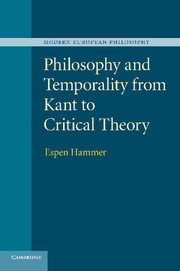Book contents
- Frontmatter
- Contents
- Acknowledgments
- Introduction
- 1 The historicity of time
- 2 Modern temporality
- 3 Two responses to the time of modernity
- 4 Hegel's temporalization of the absolute
- 5 Schopenhauer and transcendence
- 6 Time and myth in the early Nietzsche
- 7 Recurrence and authenticity: the later Nietzsche on time
- 8 Heidegger on boredom and modernity
- 9 A modernist critique of postmodern temporality
- Conclusion
- Bibliography
- Index
2 - Modern temporality
Published online by Cambridge University Press: 21 April 2011
- Frontmatter
- Contents
- Acknowledgments
- Introduction
- 1 The historicity of time
- 2 Modern temporality
- 3 Two responses to the time of modernity
- 4 Hegel's temporalization of the absolute
- 5 Schopenhauer and transcendence
- 6 Time and myth in the early Nietzsche
- 7 Recurrence and authenticity: the later Nietzsche on time
- 8 Heidegger on boredom and modernity
- 9 A modernist critique of postmodern temporality
- Conclusion
- Bibliography
- Index
Summary
According to Charles Baudelaire's famous 1863 statement, “Modernity is the transient, the fleeting, the contingent.” Considered as a category of social being, modernity makes essential reference to the present, not only as a simple portion of time, but as what passes, the contingent and the circumstantial, that which breaks with the past and throws us mercilessly into the future. The idea of modernity as marked by this particular economy of time raises a number of questions. What must temporality be like for modern agents to be able to relate to it in this way? What is the relation between, on the one hand, modernity as a concrete social formation with particular technologies, practices, identities, and ideologies, and, on the other, its temporal configuration? In what features of modernity should we search in order to account for this new time of passage and the passing? How, indeed, do modern agents relate to time more generally?
I begin this chapter by considering some of the historical factors that have led to the emergence of a modern temporality. Following such theorists of modernity as Max Weber and Georg Lukács, I argue that as purposive-rational action takes on a normative and empirical predominance over other forms of action, the socially endorsed attitudes and perceptions of time, and the ways in which our concepts are temporally schematized, become radically transformed and, in a sense, distorted.
- Type
- Chapter
- Information
- Philosophy and Temporality from Kant to Critical Theory , pp. 37 - 57Publisher: Cambridge University PressPrint publication year: 2011

